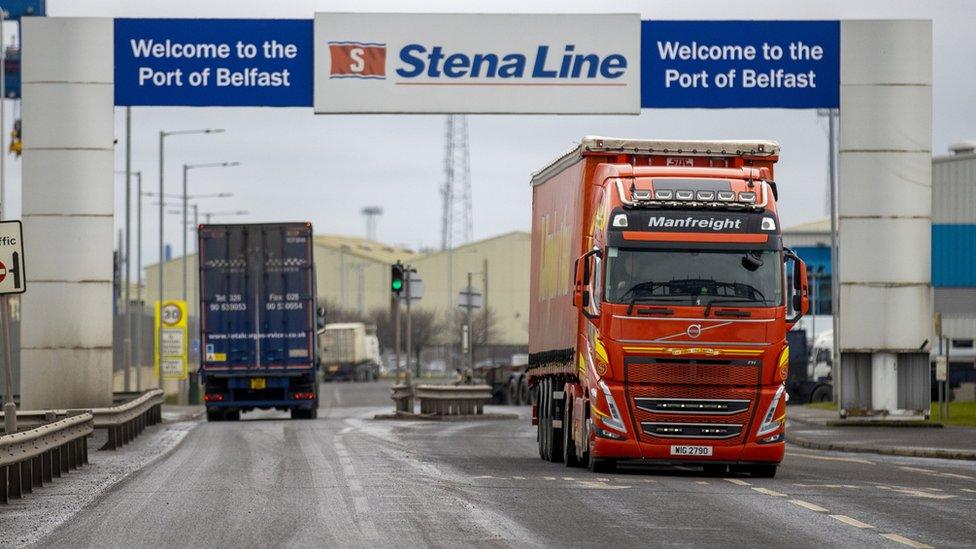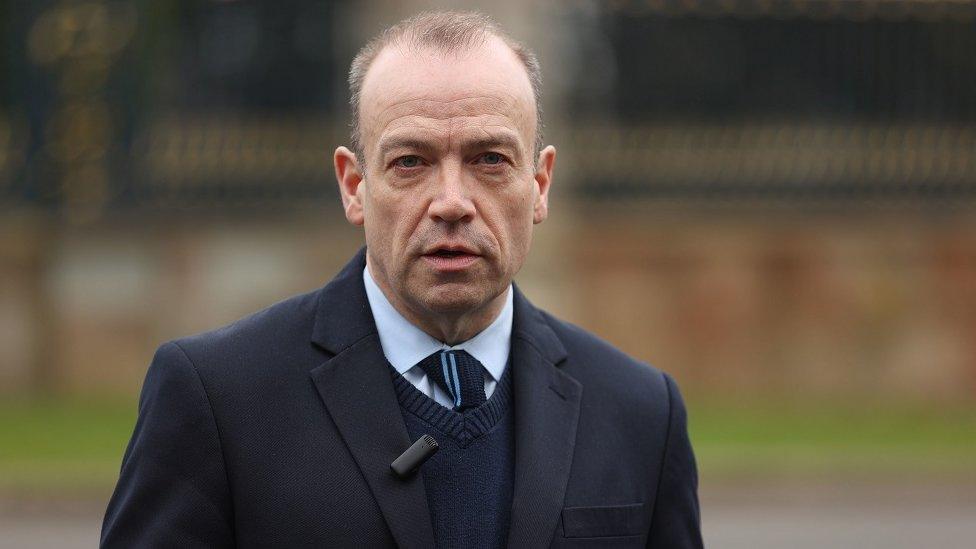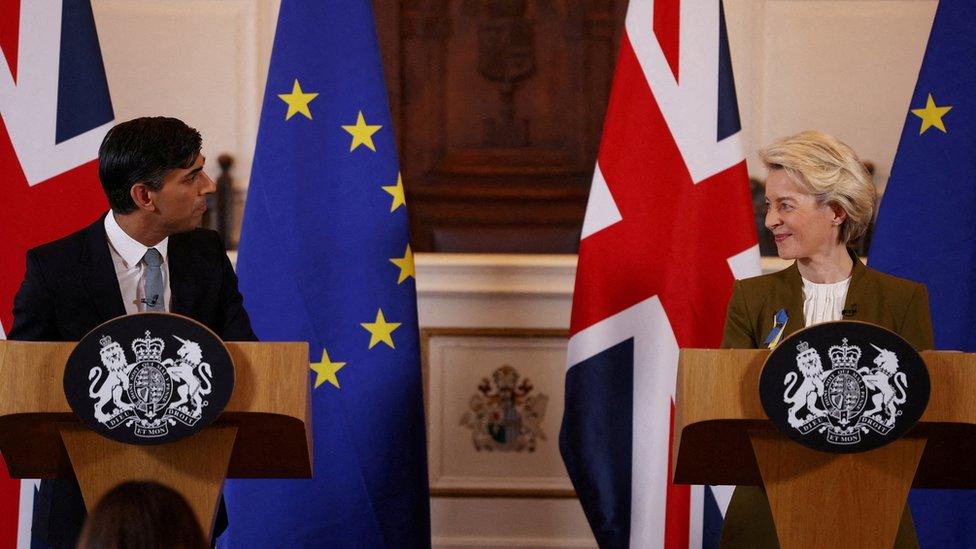Windsor Framework is an improvement on protocol but problems remain, Lords say
- Published
- comments

The Windsor Framework improves the original Northern Ireland Protocol but does not resolve all its problems, a House of Lords inquiry has concluded.
The framework, which was agreed in February, is intended to ease post-Brexit trade between Northern Ireland and the rest of the UK.
It modifies the NI Protocol, the 2019 agreement which kept NI inside the EU's single market for goods.
Some of its major operational aspects are due to be implemented from October.
They include the expansion of a trusted trader scheme and a system of green lanes and red lanes for managing the flow of goods at Northern Ireland ports.
The green lane/red lane system is supposed to reduce bureaucracy for GB goods which have Northern Ireland as their final destination.
It will operate alongside new labelling requirements for some food products entering Northern Ireland from GB.
The Lords NI Protocol subcommittee, which held the inquiry, has warned that some businesses, particularly non-retailers, will find the framework processes "more burdensome" compared to the protocol grace periods.
The grace periods refer to temporary arrangements where the protocol was not being fully implemented in some respects.

Chris Heaton-Harris says the framework offers a "huge advance" on the grace periods.
Northern Ireland Secretary Chris Heaton-Harris said the framework was a "huge advance" on the grace periods.
He added: "The grace periods were not open to all traders, they solely applied EU standards and were no help at all if the product you wanted to trade was banned."
Lord Jay of Ewelme, the committee chairman, said: "The Windsor Framework is a distinct improvement on the original protocol. But it does not solve all the problems which the protocol raises.
"The benefits to business include easier movement of goods from Great Britain to Northern Ireland through the green lane.
"For some businesses, however, processes will be more burdensome under the Windsor Framework than under the protocol as it operates now.
"And where there is uncertainty, the red lane, with its more complex procedures, may have to be used."
The report says the framework brings significant improvements in areas such as medicines, pet travel and retail goods.
But one of the major issues raised by the inquiry is the treatment of "groupage" freight and mixed loads.
Groupage is when goods dispatched by several different companies are grouped together into the same lorry load.
The concern is that if just one pallet contains goods which are going on to the Republic of Ireland then the entire load will need to be processed through the red lane which will entail bureaucracy and cost.
Sarah Hards, sales director at AM Logistics, told the inquiry that groupage was forgotten about in the original NI Protocol "and really has not been remembered for this one".
The committee has asked the government to clarify how the framework's provisions will impact upon groupage and the movement of mixed loads, and what steps are being taken to address the concerns of affected businesses.

The Windsor Framework was announced by Rishi Sunak and European Commission President Ursula von der Leyen
The inquiry also heard that regulatory divergence between GB and the EU, and therefore between GB and Northern Ireland, remains "number one concern" for businesses.
Regulatory divergence refers to the process by which new laws in either the EU or GB will, over time, lead to growing differences in the rules businesses face in each of those jurisdictions.
The committee said there was "an underlying fear" that Northern Ireland would find itself in a "no-man's land" between Great Britain and the EU, placing the competitiveness of Northern Ireland firms and their complex supply chains in jeopardy.
'Reality versus spin'
It welcomed the establishment of bodies to monitor such divergence but says it remains to be seen how effective these will be in practice.
The committee also reiterated a call for the UK government to create and maintain an up-to-date record of regulatory divergence and its impact on Northern Ireland.
In response to the report, a government spokesperson said the Windsor Framework "is the best deal for Northern Ireland", restoring the smooth flow of goods with Britain and protecting NI's place in the union.
"It cuts paperwork and checks compared to the old protocol, lifts the bans on products like seed potatoes and provides a durable, sustainable basis for the future," the spokesperson added.
"The committee's report underlines the importance of restoring the Northern Ireland Executive and Assembly - it sets out at length how restored institutions would give Northern Ireland a greater say over the new arrangements."
Seven tests
Civil servants have been running Northern Ireland departments since the Stormont executive collapsed 16 months ago, when the Democratic Unionist Party (DUP) withdrew as part of its boycott of the post-Brexit trading arrangements.
In June, the DUP submitted a paper to the UK government with proposals on how to address key issues with the Windsor Framework.
The DUP's Lord Dodds, who sits on the committee, told BBC News NI the report "vindicates" his party's stance.
"The seven tests that we have set are iterations of what previous prime ministers have set out as the bare minimum which is acceptable, so we are repeating their words," he said.
Lord Dodds added the report "says the Windsor Framework is more burdensome and onerous than the current position that we operate with the easements and grace periods".
Glyn Roberts, of business representative organisation Retail NI, said the report "sets out a fair estimation of the challenges which will be faced by the local business community with the implementation of the Windsor Accord".
He said the report "rightly highlights issues around labelling requirements that impacts on our members".
"Retail NI is disappointed at the lack of effective engagement on the labelling issue with only a few months to go before the new system is introduced," Mr Roberts said.

Analysis
The delivery of the framework and the resetting of EU/ UK relations has been perhaps the most tangible outcome of Rishi Sunak's premiership.
So it was no surprise that he came to Northern Ireland to give it the hard sell, saying it would make Northern Ireland "the world's most exciting economic zone".
The Lords' report is a somewhat more sober analysis, pointing out that issues remain.
But while UK policy continues to be a hard Brexit and a completely soft Irish border then some trade frictions on GB-NI trade will be inevitable.

Related topics
- Published2 February 2024

- Published3 December 2022

- Published27 February 2023
